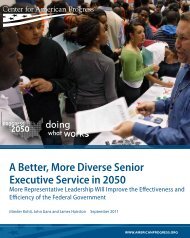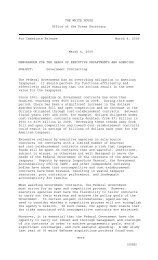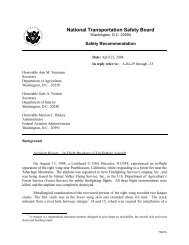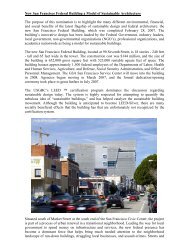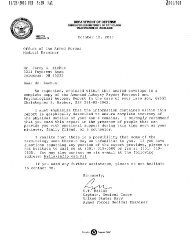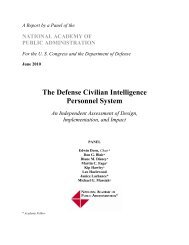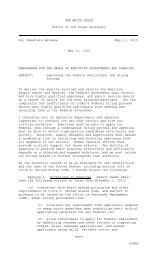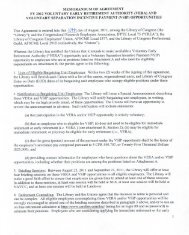Financial Management: Providing a Foundation for Transition - AGA
Financial Management: Providing a Foundation for Transition - AGA
Financial Management: Providing a Foundation for Transition - AGA
- No tags were found...
You also want an ePaper? Increase the reach of your titles
YUMPU automatically turns print PDFs into web optimized ePapers that Google loves.
26IG office, as it is when the audit team is madeup of IG staff. Executives say do not be afraid topush back on some auditor views, especially if aCFO disagrees with an auditor’s solution.CFOs should recognize when auditors identify areal issue and not go into denial, says an executive.It is not such a bad thing <strong>for</strong> an auditor to discovera material weakness, because then the CFO can fixit. Indeed, says another, use auditors as a tool anda resource to provide independent interim reportsand counseling throughout the year.During the fixing, though, it is not enoughsimply to take care of problems auditors identify.“We need to find ways to show auditorsand oversight groups we are fixing adverse auditfindings they bring up,” says an executive. Todo that, and to get along, CFOs have to talk toauditors in their own language and understandtheir job, says another.“We need to find ways to show auditors and oversight groupswe are fixing adverse audit findings they bring up.”— An executiveNo one says that there should be not auditorsor auditing. Most would agree with an executivewho is also an auditor who says, “Havingan auditor look over their shoulder motivatesprogram managers.”A message to auditorsAuditors need to consider the feedback thissurvey gives them from financial executives, suchas the following.• “Auditors have become so risk averse that theyhave abandoned their training and professionaljudgment and instead are always looking in thebook <strong>for</strong> a solution. 3 ”• “They will second-guess you, but never offerany suggestions at the start of an audit, claimingthat they can’t jeopardize their independence.”• “Auditors often come in with a developedmethodology of how to fix issues found duringfinancial statement audits, but sometimes itneither fits the entity nor gets to root of theproblems. ‘One size fits all’ may not work.”• “Why do auditors wait until near the end ofthe audit to convey good or bad news?”In addition, executives question some auditordefinitions of materiality. Even though someproblems may be real, they may not affect theintegrity of financial statements at a material level.Clearly, both auditors and auditees can benefitfrom hearing and acting on each other’s feedback.So will the American public.Changing accounting andauditing standardsWe asked survey executives if the FederalGovernment needs to revisit the accounting andauditing standards <strong>for</strong> which it holds entitiesaccountable. As shown in Figure 4, less than athird said no, keep the status quo. Half said tochange accounting standards, and 60 percentwanted to see new audit standards.Changing accounting and audit standards is adifficult thing to do: there are too many organizationsinvolved and regulatory entities inparticular tend to be jealous of their authority.However, the Executive Branch can change thefinancial statements without altering standards,which could improve how the government preparesand reports its finances.3This criticism has more generally been leveled at current practices of accountants, contracting officers and other professionals, both in andout of government.



